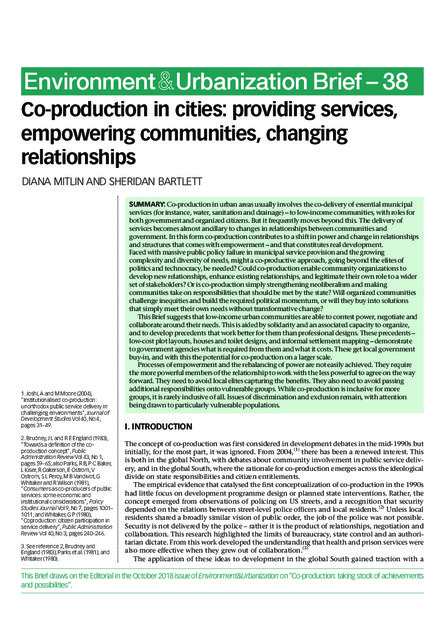
Co-production in urban areas usually involves the co-delivery of essential municipal services (for instance, water, sanitation and drainage) – to low-income communities, with roles for both government and organised citizens. But it frequently moves beyond this.
The delivery of services becomes almost ancillary to changes in relationships between communities and government. In this form co-production contributes to a shift in power and change in relationships and structures that comes with empowerment – and that constitutes real development.
Faced with massive public policy failure in municipal service provision and the growing complexity and diversity of needs, might a co-productive approach, going beyond the elites of politics and technocracy, be needed? Could co-production enable community organisations to develop new relationships, enhance existing relationships, and legitimate their own role to a wider set of stakeholders? Or is co-production simply strengthening neoliberalism and making communities take on responsibilities that should be met by the state?
Will organised communities challenge inequities and build the required political momentum, or will they buy into solutions that simply meet their own needs without transformative change? This Brief suggests that low-income urban communities are able to contest power, negotiate and collaborate around their needs. This is aided by solidarity and an associated capacity to organise, and to develop precedents that work better for them than professional designs.
These precedents – low-cost plot layouts, houses and toilet designs, and informal settlement mapping – demonstrate to government agencies what is required from them and what it costs. These get local government buy-in, and with this the potential for co-production on a larger scale. Processes of empowerment and the rebalancing of power are not easily achieved. They require the more powerful members of the relationship to work with the less powerful to agree on the way forward. They need to avoid local elites capturing the benefits. They also need to avoid passing additional responsibilities onto vulnerable groups.
While co-production is inclusive for more groups, it is rarely inclusive of all. Issues of discrimination and exclusion remain, with attention being drawn to particularly vulnerable populations.
Links
Resource collections
- Locally led humanitarian action
- Topics
- UN Habitat - Urban Response Collection
- Urban Response - Urban Crisis Preparedness and Risk Reduction
- Urban Response Collection - Community Engagement and Social Cohesion
- Urban Response Collection - Economic Recovery
- Urban Response Collection - Environment and Climate Change
- Urban Response Collection - Housing, Land and Property
- Urban Response Collection - Urban Crisis Response, Recovery and Reconstruction
- Urban Response Collection - Urban Resilience
